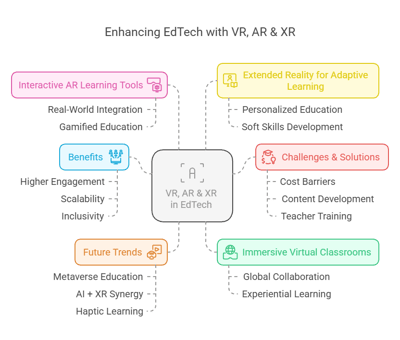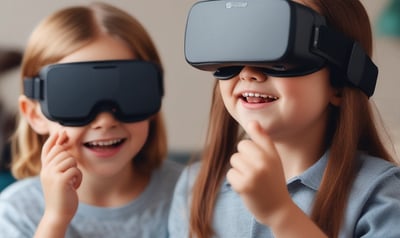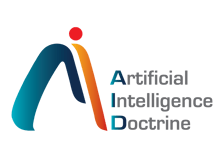Immersive Learning Solutions
Transforming education through VR, AR, and XR for engaging learning experiences.


Experiential Training
The integration of Virtual Reality (VR), Augmented Reality (AR), and Extended Reality (XR) is revolutionizing the EdTech industry by creating immersive, interactive, and personalized learning experiences. These technologies are breaking traditional classroom barriers, fostering engagement, and improving knowledge retention across all educational levels.
How VR, AR & XR Enhance EdTech
1. Immersive Virtual Classrooms (VR)
Global Collaboration: Students and educators interact in shared 3D virtual spaces, overcoming geographical limitations.
Experiential Learning: VR simulations enable hands-on training in fields like medicine (virtual surgeries), engineering (equipment repair), and science (lab experiments).
2. Interactive AR Learning Tools
Real-World Integration: AR overlays digital content onto physical textbooks or classroom objects, making abstract concepts tangible (e.g., visualizing 3D molecular structures in chemistry).
Gamified Education: Apps like Quiver use AR to turn coloring pages into animated 3D models, enhancing engagement for younger learners.
3. Extended Reality (XR) for Adaptive Learning
Personalized Education: AI-driven XR platforms adjust content difficulty based on student performance, catering to individual learning paces.
Soft Skills Development: XR environments simulate real-world scenarios (e.g., job interviews, public speaking) to build confidence and competence.
Benefits for the EdTech Industry
Higher Engagement: Immersive experiences reduce dropout rates by making learning interactive and fun.
Scalability: Virtual labs and field trips reduce costs associated with physical resources and travel.
Inclusivity: Students with disabilities or those in remote areas gain access to high-quality education.
Challenges & Solutions
Cost Barriers: Affordable mobile-based AR and standalone VR headsets are expanding accessibility.
Content Development: EdTech companies are partnering with educators to create curriculum-aligned immersive content.
Teacher Training: Professional development programs are integrating XR tools to empower educators.
Future Trends
Metaverse Education: Schools and universities will adopt persistent virtual campuses for hybrid learning.
AI + XR Synergy: Intelligent tutors in VR will provide real-time feedback and assessments.
Haptic Learning: Touch-responsive XR gloves will enable tactile experiences in vocational training.
VR, AR, and XR are transforming the EdTech industry by making learning immersive, accessible, and future-ready. As these technologies evolve, they will redefine education, equipping students with the skills needed for tomorrow’s workforce.


Get in Touch with Us


Get in touch
83 Watsonbrook Dr. Brampton, L6R 0R5, ON, Canada
contact@aidoctrine.com
Shahed Tower, 10 Floor, Mirgab, Kuwait city, Kuwait
